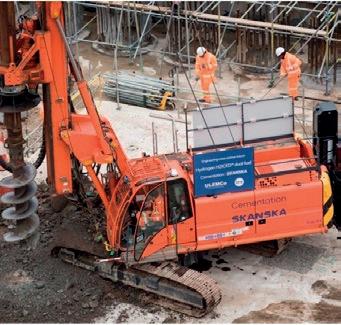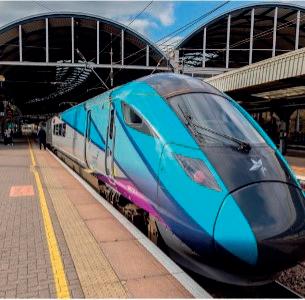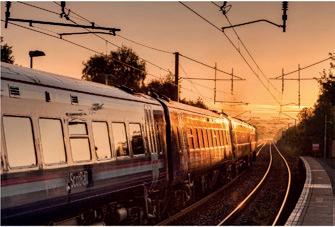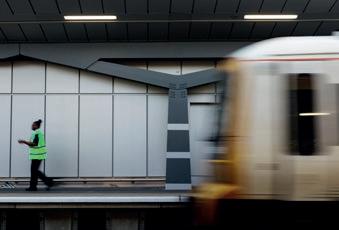
8 minute read
20 YEARS WORKING FOR A SMARTER, SAFER RAILWAY
Helping the rail network to cope with extreme rainfall, using artificial intelligence to help reduce train delays caused by ‘leaves on the line’ and helping freight train operators to run longer trains at no extra cost
– these are three recent examples of how the 20-year-old Rail Safety and Standards Board is working to make Britain’s railway safer, more efficient and more sustainable.
Advertisement
Phillips, who joined the RSSB as CEO in 2016, said that the Board’s independent view on the industry’s safety performance had “driven good progress” since its establishment in 2003, following the Cullen inquiry into the Ladbroke Grove rail crash in 1999. By providing the place for a fragmented rail sector to collaborate on standards and, more recently, to develop leadership in sustainable rail, he said that the RSSB has helped the industry to thrive and to adopt new technologies.
Focussing on the Board’s most recent work, he highlighted:
■ the development of an operational planning tool for Network Rail that will help it to deliver the most effective operational responses to the risk of earthwork collapse following extreme rainfall. The tool, currently being piloted in the North West and Central regions prior to its nationwide roll-out, evaluates the risk of derailment, risks from speed restrictions and economic impacts, providing a more effective operational plan than blanket speed restrictions.
■ collaboration with the University of Sheffield to develop a tool using artificial intelligence to help predict low adhesion track conditions, the seasonal challenge associated with ‘leaves on the line’. Such conditions are a serious safety and operational issue for the rail industry, costing around £350m a year and causing delays, as well as sometimes resulting in station overruns and signals being passed at danger. The project will use artificial intelligence to analyse data and high-resolution video footage to deliver more accurate predictions about friction at the wheel-rail interface. An online tool that will generate friction predictions for anywhere on the network will be available this autumn.
■ completion of a research project, funded by the Department for Transport, which will mean that freight train operators can safely haul more goods wagons per train than historic practices allowed, improving both their environmental impact and financial efficiency. The research has enabled existing couplers, which connect freight wagons, to safely connect more load without the need to upgrade or undertake a detailed engineering assessment. A 235-mile journey with 19 wagons can be increased to 23 wagons, delivering projected annual savings of £364k. The rail industry is now implementing the new ratings and identifying routes suitable for longer freight services.
An Independent Body
Phillips emphasised that, while the RSSB has continued to evolve and add new services, it still plays the role envisaged for it by the Cullen inquiry, as an independent not-forprofit membership body bringing together the different parts of the rail industry to improve safety and to discuss changes in standards. The Board encompasses infrastructure managers, passenger train operators, freight operators, the rolling stock owners and leasing companies, suppliers and contractors.
He spoke positively about the contribution of RIA, representing the rail supply industry, giving as an example the recently updated standard on AC electrification. Phillips said “where there are particular areas that are important that may require changes then that representative voice from collective members can be helpful. So, as an example, we updated the AC electrified line standard last year and RIA was able to provide some useful inputs from its members into our work on that – because, ultimately, the goal of many parts of the industry is to see more electrification.
It obviously benefits sustainability, it benefits cost reduction, it benefits the supply chain and so RIA was able to provide some useful input into that”.
The Board has predicted that the revised standards for AC electrification systems and rolling stock will help the rail industry save millions of pounds when delivering new electrification schemes and provide confidence that trains and the electrification infrastructure are compatible with each other. It says that the standards will help the industry reduce complexity and avoid unnecessary cost whilst maintaining safety and delivering good operational performance.
Beyond electrification, the RSSB is also working on standards for hydrogen fuelled trains and battery operation taking into account the constraints involved in both.
For example, Phillips said, “putting a hydrogen-propelled train into a long tunnel and managing the safety aspects of that. Thinking about locations around the network where hydrogen might be stored to fuel trains. How might you recharge a battery train? You can do it in a depot, but you will probably need to top it up in the course of its journey, so will that be done by a transponder on the track, or will it be through an overhead device.? All those things need standards applied to them and they also require risk assessment. We can provide some technical answers to the industry to manage those issues”.
Our Commercial Operations
While the RSSB was established as an NHS-style ‘free at the point of use’ technical adviser for its members, in recent years it has also started to do bespoke commercial work for members and others both in the UK and internationally. Phillips said that this commercial function now accounts for 25% of the RSSB’s total turnover and is paying for an increased range of services for members, including a health and well-being team, a new data insights team and a Futures Lab focussed on future technologies – “all of those people are paid for by the surplus that we have generated from our commercial operations”.
Looking ahead to the creation of Great British Railways, Phillips said that the Williams-Shapps plan was very clear that there is a need for the RSSB going forward. It would remain independent, because, he said “you do need to have this separate place where all the parties in the industry can come together to share safety data without the fear of reprisal or contractual issues with those that they contract to provide a service for. We can provide that independent view as to how they are managing safety and give advice in terms of how they might improve. That is the expectation set out in the Williams-Shapps plan”.
On the Labour party’s rail nationalisation proposals, he noted that the former Shadow Secretary of State for Transport, Andy McDonald, had proposed putting RSSB into the nationalised body.
But Phillips said “RSSB are independent and entirely neutral, so will continue to work with whichever party is in Government. No matter who is in Downing Street the role of RSSB and the importance of safety does not change. The industry is fragmented and will remain so, even if a Labour Government brings together track and train you will still have private freight companies, private rolling stock owners, supply chain and contractors. So, you will still have many players. You will still have Transport for Wales and Transport Scotland and regional Mayors with regional needs. We will continue to push the benefits of the RSSB, as recommended by Cullen, because those issues won’t change”.
Railway industry leaders send open letter to the PM, urging GBR Rail Reform legislation not to be delayed beyond the current Parliament

70 rail business leaders wrote to the Prime Minister, Rishi Sunak, urging him not to delay in bringing forward legislation to enact the Government’s rail reform plans in the coming Parliamentary year. Legislation is needed to create Great British Railways (GBR), which will bring track and train operations together within one body.

Agreement for Trans-Pacific Partnership (CPTPP), a vast free trade area of 11 countries spanning the Indo-Pacific.

The historic agreement follows two years of intense negotiations by the Department for Business and Trade and puts the UK at the heart of a dynamic group of economies, as the first European member and first new member since CPTPP was created.
Hitachi Rail and Global Centre of Rail Excellence (GCRE) sign an agreement
The Department for International Trade launched a consultation on an enhanced trade deal with South Korea. The consultation requested input from businesses and the public on which aspects of our current trading relationship with South Korea should be improved.
Rail passenger numbers on a record post Covid high
The Department for Transport published its post-Covid national rail passenger figures on Wednesday 10 May, showing a record post Covid high daily average of 98.3% for the month of April. Of the 30 days in April, 14 days registered 101% to 106%, and only four days saw less than 90% (88%) on the first four days of the month.
HS2’s multi-billion-pound boost for UK businesses
Latest figures from HS2 show that tier two subcontracts totalling £7.9bn have been awarded to over 2,000 UK-based companies, with SMEs securing £3.6bn worth of orders – a 45% share.
Businesses in every UK region have won work supporting HS2’s construction, with the East of England, West Midlands, Greater London and the South East each amassing over £1bn worth of contracts.
World first as HS2 trials dual-fuel piling rig on London site
HS2 has taken a further step forward in decarbonising the constructure sector, completing a world first by installing four 30-metre deep piles on a London site using a hydrogen dual-fuel piling rig.

The trial took place as part of work done in partnership by ULEMCo and Cementation Skanska, working with the world-leading Business Research Establishment (BRE), funded through the BEIS Phase 1 Red Diesel Replacement competition.
UK joins the Comprehensive and Progressive Agreement for Trans-Pacific Partnership
The UK has joined the Comprehensive and Progressive
New report reveals Government falling behind on rail decarbonisation targets
The Department for Levelling Up, Housing and Communities have published plans to reform the Nationally Significant Infrastructure Projects regime. This will include a ‘fast-track’ service to support early meaningful engagement and potential resolution of differences between key parties.
TransPennine Express is first rail operator to be declared Carbon Literate
TransPennine Express’s efforts to become a sustainable and environmentally friendly train operator have been recognised by the Carbon Literacy Trust, which has said that the operator is Carbon Literate. TransPennine Express is the first train operator to attain this level in the UK.
State takes control of TransPennine Express

TransPennine Express is now being run by the state after ministers announced that the rail company would not have its contract renewed.
The Transport Secretary, Mark Harper, said the northern rail network would be run by the stateowned operator of last resort after passengers experienced disruption and cancellations.
CIHT reaffirms the urgent need for the National Transport Strategy for England
The Chartered Institution of Highways and Transportation (CIHT) reaffirmed the urgent need for the National Transport Strategy for England. CIHT believes that the National Transport Strategy for England should identify critical national objectives and the transport development direction in England with a 10–20-year perspective.
NSAR launches Skills Match to proactively support rail employers on apprenticeship recruitment
National Skills Academy for Rail (NSAR) launched a Skills Match to proactively support rail employers on apprenticeship recruitment. Skills Match was created to help solve the severe shortfall of workers urgently required across the rail industry and introduce new talent and skills needed to modernise the industry.
The rail industry has a low apprenticeship recruitment rate comparative to other industries. Around 2,500 apprentices join the sector each year, NSAR estimates that the UK’s rail industry requires at least 5,000 new apprentices per year to meet demand for its current work pipeline and to replace the sector’s ageing workforce.
HS2 launches rail systems innovation competition


The company delivering Britain’s new high speed rail network has launched an innovation competition to bring new thinking to the installation of key rail systems infrastructure including track and signalling on the new line. HS2 Ltd is looking for companies of any size and industry to enter its competition and propose new ideas to automate rail systems installation in four key categories: tunnel systems; signalling; slab track; and cabling.
More industrial action set for July
The action is part of their ongoing dispute about pay and conditions. Strikes will be held on Thursday 20, Saturday 22 and Saturday 29 July. Members of the RMT union will be taking action at 14 rail companies.










